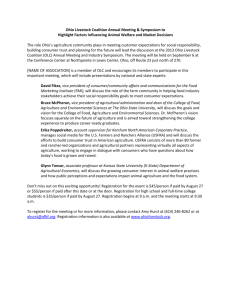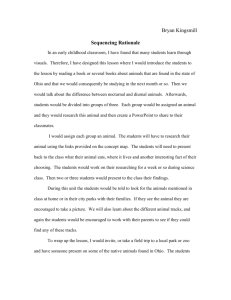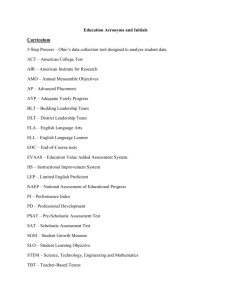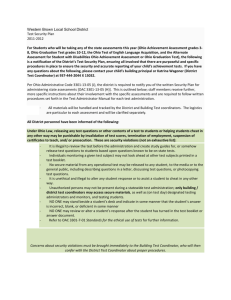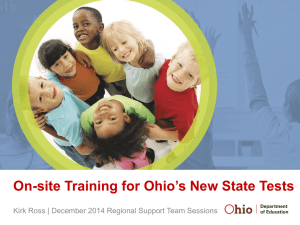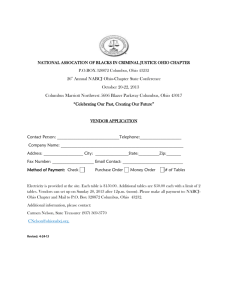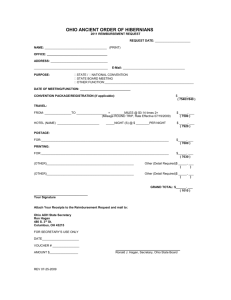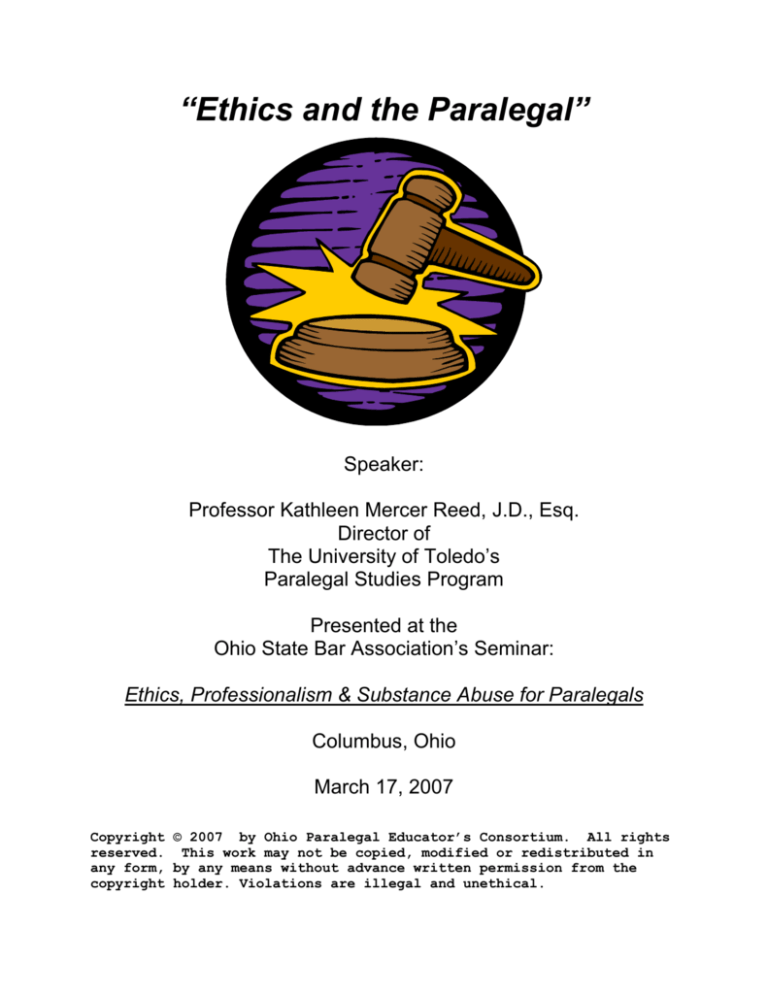
“Ethics and the Paralegal”
Speaker:
Professor Kathleen Mercer Reed, J.D., Esq.
Director of
The University of Toledo’s
Paralegal Studies Program
Presented at the
Ohio State Bar Association’s Seminar:
Ethics, Professionalism & Substance Abuse for Paralegals
Columbus, Ohio
March 17, 2007
Copyright © 2007 by Ohio Paralegal Educator’s Consortium. All rights
reserved. This work may not be copied, modified or redistributed in
any form, by any means without advance written permission from the
copyright holder. Violations are illegal and unethical.
SOURCES OF ETHICAL GUIDANCE FOR PARALEGALS
I.
FOR PARALEGALS
1) National Association of Legal Assistants (NALA) – Model Standards and
guidelines for Paralegals (Revised 1990):
NALA is a voluntary organization and its guidelines are aspirational to “provide
references to the existing case law and other authorities where the underlying
issues have been considered. The authorities cited [are to] serve as a basis
upon which conduct of a legal assistant may be analyzed as proper or improper.”
VIII.
In the supervision of a legal assistant, consideration should be given
to:
…
3.
Monitoring the work and professional conduct of the legal
assistant to ensure that the work is substantively correct
and timely performed;…
Comment: The attorney’s responsibility for supervision of Paralegals
must be more than willingness to accept responsibility and liability for
the legal assistant’s work. The attorney must monitor the work
product and conduct of the legal assistant…This duty includes the
responsibility to provide continuing legal education for the legal
assistant…
In Spindell v. State Bar of California, 118 Cal.Rptr. 480, 530 P.2d 168
(1975), the attorney was suspended from practice because of the
improper legal advice given by a secretary. This case illustrates that
it is important that both attorneys and Paralegals confirm all
telephonic advice by letter…
2) National Federation of Paralegal Associations, Inc. (NFPA) – Model Code of
Ethics and Professional Responsibility (Revised 1993):
NFPA is a voluntary organization and its guidelines are aspirational to “delineate
the principles for ethics and conduct to which every paralegal should aspire.”
CANON 7.
Of Law.
A Paralegal Shall Not Engage In The Unauthorized Practice
ETHICAL CONSIDERATIONS
EC 7.1 A paralegal shall comply with applicable legal authority governing
the unauthorized practice of law.
2
II.
FOR ATTORNEYS
1)
American Bar Association (ABA) – Canon of Professional Ethics
The original Canons of professional ethics were adopted by the ABA in 1908.
There were 47 original canons. All states except California adopted the Canons
in some form. In 1970 the Canons were amended to nine and became part of
the ABA Model Code.
CANON 3: A Lawyer Should Assist In Preventing the Unauthorized
Practice of Law.
2)
American Bar Association (ABA) – Model Code of Professional
Responsibility
The Model Code was established in 1970, and adopted by all states
except California (which maintains its own rules of professional conduct).
Prior to 1980, most states codified their standards for attorneys as well as
utilizing the ABA Model Code. The Model Code was amended for the last
time in 1980. The Model Code added Ethical Considerations (guidance)
and Disciplinary Rules (minimum level of ethical behavior) to explain the
Canons (general statements).
CANON 3: A Lawyer Should Assist In Preventing the Unauthorized
Practice of Law.
EC 3-6: A lawyer often delegates tasks to clerks, secretaries, and other
lay persons. Such delegation is proper if the lawyer maintains a direct
relationship with his client, supervises the delegated work, and has
complete professional responsibility for the work product. This delegation
enables a lawyer to render legal services more economically and
efficiently.
DR 3-101: A lawyer shall not aid a nonlawyer in the unauthorized practice
of law.
3)
American Bar Association (ABA) – Model Rules of Professional
Conduct
In August of 1983, the ABA completely revised the Model Code to take
into consideration many changes in policy, such as attorney advertising.
This change became the Model Rules, which is much more pointed and
direct in its proscriptions of unacceptable conduct. The Model Rules are
organized into the Rule of Comments. When the Rule is subject to broad
interpretation the Comments help to narrow the interpretations. Some
3
states, including Ohio, chose not to adopt the Rules. However, it is
important for every legal professional to understand both the Code and the
Rules because both are used in various jurisdictions, because the Rules
used the Code as its basis, and because Code jurisdictions still look to the
rules for practical guidance and examples.
RULE 5.5 Unauthorized Practice of Law
A lawyer shall not:…
(b) assist a person who is not a member of the bar in the performance of
activity that constitutes the unauthorized practice of law.
Comment:.. Paragraph (b) does not prohibit a lawyer from employing the
services of paraprofessionals and delegating functions to them, so long as
the lawyer supervised the delegated work and retains responsibility for
their work….
4)
American Bar Association (ABA) - Model Guidelines for Use of
Paralegals
The ABA is a completely voluntary organization, and its opinions are not
legally binding on a court of law, but the ABA is very influential among
attorneys as well as non-attorneys. These guidelines were enacted in
1991 by the ABA’s Standing Committee on Paralegals to provide guidance
for attorneys utilizing Paralegals.
3. A lawyer may not delegate to a legal assistant:
a. Responsibility for establishing an attorney-client relationship
b. Responsibility for establishing the amount of a fee to be charged
for a legal service
c. Responsibility for a legal opinion rendered to a client.
III.
FOR ALL LEGAL PROFESSIONALS
5)
Code of Professional Responsibility (O.R.C.)
Ethical rules in Ohio are based on the ABA Code of Professional
Responsibility, adopted in Ohio in 1970. Violations of the rules can lead to
sanctions. Under rule five of the Ohio Supreme Court’s Rules for the
Government of the Bar, complaints are investigated and prosecuted by the
Ohio State Bar Association, the state Disciplinary Council or certified local
bar grievance committees.
4
CANON 3: A Lawyer Should Assist In Preventing the Unauthorized
Practice of Law.
EC 3-6: A lawyer often delegates tasks to clerks, secretaries, and other
lay persons. Such delegation is proper if the lawyer maintains a direct
relationship with the client, supervises the delegated work, and has
complete professional responsibility for the work product. This delegation
enables a lawyer to render legal services more economically and
efficiently.
DR 3-101: A lawyer shall not aid a nonlawyer in the unauthorized practice
of law.
6)
Ohio Rules of Professional Conduct
Effective February 1, 2007)
(Adopted August 1, 2006 –
See, below, information on the new Ohio ethics rules.
5
POSSIBLE PENALTIES FOR UNETHICAL CONDUCT
While some of the ethics rules pertain exclusively to attorneys, the paralegal plays an
important part in setting the ethical tone of the law office. If an attorney violates an
ethical rule, sanctions range from disbarment for extremely unethical activities to a
warning “slap on the wrist” for minor infractions. Paralegals must always be aware
that under the doctrine of respondeat superior, their actions are imputed to the
supervising attorney. In addition, unethical conduct can result in severe personal
penalties against the paralegal. Examples of some of the possible penalties for
unethical conduct are:
For the Attorney:
Disbarment (permanent revocation of an attorney’s license)
Suspension (temporary revocation of an attorney’s right to
practice law)
Public or private censure (reprimand) by the courts or bar
associations
Fee withheld
Contempt of Court
Ruined professional reputation
For the Paralegal:
Criminal and civil penalties
Held to attorney’s standard of care and competence (in a tort
action)
Contempt of court
Ruined professional reputation
Employment terminated
6
History of Ethics in Ohio
ABA adopts Model Code of Professional Responsibility – 1970
Ohio adopts Code – July, 1973
ABA adopts Model Rules of Professional Conduct – 1983
Adopted by 45 states
Supreme Court Task Force on Rules of Professional Conduct –
March, 2003
Model Rule format adopted by Court – July 18, 2006
Effective date of new Rules – February 1, 2007
Format of the New Ohio Rules of Professional Conduct
Table of Contents
Preamble: A Lawyer’s Responsibilities
Scope
Terminology
Rules
Comment
Comparison
Correlation Section
7
OHIO RULES OF PROFESSIONAL CONDUCT (ORPC)
NEW RULES AFFECTING PARALEGALS AND
NON-LAWYERS
A. INTRODUCTION
Effective February 1, 2007, Ohio's new ethics code became effective. The Ohio
Rules of Professional Conduct (ORPC) is based on the American Bar Association's
Model Rules of Professional Conduct, as modified by the Ohio Supreme Court. The new
code replaces the Ohio Code of Professional Responsibility.
B. RULES AND COMMENTS IN THE ORPC OF PARTICULAR RELEVANCE TO
PARALEGALS AND OTHER NONATTORNEYS
While all of the provisions in the ORPC are important, the following rules and
official comments are of particular relevance to paralegals and other non-lawyers:
► 1.0 Comment 9 (duties of paralegals and other law firm personnel when screening is
imposed in conflict cases) Pages 8-9
► 1.4 Comment 4 (a lawyer's staff should be used to acknowledge receipt of requests
for information from clients) Page 21
► 1.6 Comment 16 (a lawyer must act to prevent inadvertent disclosure of confidential
information by his or her employees) Pages 33-34
► 1.8(c) (a lawyer shall not prepare on behalf of a client an instrument giving the lawyer
or the lawyer's paralegal a gift) Page 47
► 1.10 Comment 4 (paralegals should be screened for conflicts; imputed
disqualification does not apply to non-lawyers, including paralegals) Page 64
► 1.10 Comment 4 (a non-lawyer's duty to protect confidential information) Page 64
►1.11(d)(2)(ii) (Unless a law specifically permits, a lawyer who is, at that time, serving
as a pubic officer or employee, shall not attempt to obtain private employment with any
one connected with a case in which the lawyer is participating. However, if the lawyer is
serving as a law clerk to an arbitrator, judge, or other adjudicative officer, he or she can
attempt to secure private employment as permitted by Rule1.12(b) and subject to the
conditions of Rule 1.12(b).) Page 69
►1.12(a) (Regarding a case in which a lawyer assisted personally and substantially as
a law clerk, the lawyer cannot represent a party from that case unless all the parties
involved give fully informed, written consent.) Page 72
8
►2.4 Comment 3 (When lawyers are acting as third-party neutrals, they must very
thoroughly educate those who are unrepresented so they understand that the lawyer is
not representing them personally. Nonlawyers, as they cannot represent clients as a
lawyer, would probably not experience this possible situational confusion.) Page 108
► 3.9 Comment 2 ("Lawyers have no exclusive right to appear before non-adjudicative
bodies, as they do before a court.") Page 132
►4.2 Comment 4 (This rule prohibits a lawyer representing one client from
participating in discussions regarding his client with another person known to be the
client of separate lawyer. This comment gives an example in that the lawyer could
communicate with a nonlawyer representative of the person not his client regarding
other issues not related to the present case.) Page 135
► 5.3(a) (managers must take reasonable efforts to ensure that measures are in place
that give reasonable assurance that paralegals and other non-lawyer assistants will
comply with ethical rules) Page 144
► 5.3(b) (supervisors must take reasonable efforts to ensure that paralegals and other
non-lawyer assistants will comply with ethical rules) Page 144
► 5.3(c) (lawyers who order or ratify ethical misconduct by paralegals and other nonlawyer assistants) Page 144
► 5.3 Comment 1 (independent contractors) Page 144
► 5.3 Comment 1 (lawyers must give paralegals and other non-lawyer assistants
appropriate instruction and supervision concerning the ethical aspects of their
employment, particularly regarding the obligation not to disclose information relating to
representation of the client, and should be responsible for their work product.) Page 144
► 5.3 Comment 2 (When nonlawyers are employed by lawyers, it is expected of the
lawyers with the managerial responsibilities in the organization to provide adequate
training via policies and procedures to assure that the nonlawyers in their employ will
conduct themselves in a manner consistent with the Ohio Rules of Professional
Conduct.) Page 144
► Comparison to former Ohio Code of Professional Responsibility (Although there
is no Disciplinary Rule that is the same in scope as Rule 5.3, it is expected that
secretaries employed by lawyers would also be chosen and trained to respect and
protect client confidentiality.) Page 145
► 5.4(a) (lawyers shall not share legal fees with a non-lawyer) Page 146
► 5.4(a)(3) (lawyers may include non-lawyer employees in a compensation or
retirement plan even if based upon a profit-sharing arrangement) Page 146
9
► 5.4(b) (lawyers may not form a partnership with a non-lawyer if any part of it consists
of the practice of law) Page 146
► 5.4(d)(1) (non-lawyers cannot own an interest in a law practice) Page 146
► 5.4(d)(2) (non-lawyers cannot be directors or officers of a law practice) Page 146
► 5.4(d)(3) (non-lawyers cannot have the right to direct or control the professional
judgment of a lawyer) Page 146
► Comparison to the former Ohio Code of Professional Responsibility (Rule 5.4
speaks to the professional independence of the lawyer. It is noted here that DR 3102(A) disallows the division of fees with nonlawyers. Additionally, DR 3-103 and DR 5107(C) disallow a lawyer from forming a partnership with a nonlawyer and forbid the
practicing in a professional corporation by a lawyer with a nonlawyer.) Page 147
► 5.5 Comment 2 (lawyers can employ the services of paraprofessionals and delegate
functions to them, so long as the lawyers supervise the delegated work and retains
responsibility for their work) Page 149
► 5.5 Comment 3 (lawyers may provide professional advice and instruction to nonlawyers whose employment requires knowledge of the law, e.g., claims adjusters) Page
149
► 5.5 Comment 3 (lawyers also may assist independent non-lawyers, such as
paraprofessionals, who are authorized by the law of a jurisdiction to provide particular
law-related services) Page 149
► 5.5 Comment 3 (lawyers may counsel non-lawyers who wish to proceed pro se)
Page 149
► 5.5 Comment 13 (lawyers admitted in other jurisdictions providing services in Ohio
that non-lawyers may perform but that are considered the practice of law when
performed by lawyers) Page 151
► 5.7(e) (This explains that the term 'law-related services' can realistically indicate
services that a nonlawyer could perform without performing the unauthorized practice of
law.) Page 154
►5.7 Comment 8 (The lawyer accepts the responsibility for both himself and
nonlawyers in his employ to keep distinctly separate the legal services and law-related
services, as required by Rule 5.3, and also to maintain compliance with the Ohio Rules
of Professional Conduct.) Page 156
10
► 7.2(b) (lawyers shall not give anything of value to someone for recommending the
lawyer's services) Page 167
► 7.2 Comment 5 (reciprocal referral agreements between a lawyer and a non-lawyer
are prohibited) Page 168
► 7.2 Comment 5A (non-lawyers who prepare advertising and other marketing
material for lawyers) Page 168
► 7.2 Comparison to ABA Model Rules of Professional Conduct (To be in
compliance with Rule 7.2, reciprocal referral arrangements between nonlawyer
professionals and lawyers is forbidden.) Page 169
► 7.5(a) (In regards to firm names and letterheads: it would be construed as misleading
to include the name of a non-lawyer no longer employed by the organization in the
letterhead.) Page 178
► 7.5 Comment 1 (it is misleading to include the name of a non-lawyer in the name of
a law firm) Page 178
► 7.5 Comment 4 (a legal clinic cannot be owned by, and profits or losses cannot be
shared with, non-lawyers) This comment also speaks specifically to lawyers operating
legal clinics. Page 179
► Comparison to former Ohio Code of Professional Responsibility "Comment [4]
speaks to the restrictions of DR 2-102(G) as they relate to operating a "legal clinic" or
using this same indication for a business.) Page 179
►8.4(a) (It would be considered professional misconduct for a lawyer to, with
knowledge, help another, ask for the assistance of another, or, through the actions of
another, violate the Ohio Rules of Professional Conduct.) Page 186
► 8.4 Comment 1 (misconduct when a lawyer requests or instructs an agent to engage
in misconduct on the lawyer's behalf) Page 186
11
OHIO CASES & OPINIONS AND ARTICLES
AFFECTING PARALEGALS AND NON-LAWYERS
ABA Information Opinion 88-1521
This Opinion endorses screening of a paralegal that has a conflict with a client’s
interest.
Comment 4 to Rule 1.10 of the ABA Model Rules
The rule on imputed disqualification – prohibiting other members of the firm from
representing a client when one of them would be prohibited – does not apply to nonattorneys. (However, see, Kala v. Alumn.Smelting, and Green v. Toledo Hospital,
below.)
Land Title Abstract & Trust Co. v. Dworken, 129 Ohio St. 23, 193 N.E. 650 (1934).
This is considered the seminal case regarding UPL in Ohio, by defining what is the
practice of law. The practice of law is the doing or performing services in a court of
justice, in any matter, throughout its various stages. It also includes legal advice and
counsel, and the preparation of legal instruments and contracts by which legal rights are
secured, whether or not the matter is in court.
Kala v. Aluminum Smelting & Refining Co., Inc., 81 Ohio St. 3d 1, 688 N.E.2d 258
(1988).
Screens are permitted of non-lawyer employees who move to a different firm.
Board of Commissioners on Grievances and Discipline, Advisory Opinion 89-16,
Issued June 16, 1989.
In the BOC’s view, non-lawyer employees may not be listed on a law firm’s letterhead.
Office managers and other non-lawyer employees may have business cards
designating their title and identifying them as employed by the firm. (Opinion reaffirmed
by opinion letter dated October 25, 2004)
Kalish, The Side Switching Staff Person in a Law Firm: Uncomplimentary
Assumptions and an Ethics Curtain, 15 Hamline L.Rev. 35 (1991).
Screening should be a permissible method to protect confidences held by non-lawyer
employees who change employment in order to prevent conflict of interests.
Ohio State Bar Assn. et al. v. Martin, d.b.a. Kensington Estate Services, 642
N.E.2d 75 (1994).
12
A non-attorney engaged in UPL by rendering legal advice to residents concerning the
need and advisability of various types of trust documents, and collected fees in
exchange for legal services. The board authorized relators to commence an action in a
court for the determination whether the non-attorney engaged in UPL and for the
appropriate injunctive relief permanently enjoining the non-attorney from doing so.
Mahoning Co. Bar Assn. v. The Senior Services Group, INC., 66 Ohio Misc. 2d 48,
642 N.E.2d 102 (1994).
Financial services corporation engaged in UPL by giving legal advice in connection with
the corporation's estate planning services provided to the public. The Board authorized
the bar association to commence an action in a court and further authorized the bar
association to seek reimbursement from the Board for expenses and attorney fees
incurred in further prosecution of the matter.
Akron Bar Assn. v. Greene, 77 Ohio St. 3d 279, 673 N.E.2d 1307 (1997).
Non-lawyers engaged in UPL because they were not licensed attorneys but prepared
pleadings and made court appearances, and they continued to do so despite
representations to petitioner relator that they would desist. Non-lawyers were enjoined
from any further activity involving the practice of law.
Law Student Advocates and Conflicts of Interest, 73 Wash. L.Rev. 731 (1998).
This Comment proposes a student conflict of interest rule that balances interests by (1)
holding student advocates to high ethical standards and (2) allowing screening to cure
most conflicts that occur within student representation and that would otherwise
handicap students in future employment. A rule applying attorney conflict of interest
rules to student advocates, yet allowing screening to cure imputed disqualification, will
encourage student practice, ensure that students develop ethical frameworks, and
protect clients. "Screening" is a method of preventing imputed disqualification in which a
law office insulates a lawyer who possesses confidential information from contact with a
party adverse to the lawyer's former client or a client of the lawyer's former firm. A
variation on the student advocate hypothetical demonstrates how the available
screening models apply to student advocates.
Latson v. Blanchard, Ohio App. (9th Dist. 1998).
Paralegal worked on the victim's case at her previous job and was going to be allowed
to work on the victim's case at her new place of employment. The ABA outlined the
screening that is required when a non-lawyer moves from one law firm to another law
firm as follows: With respect to new employees who formerly worked for other lawyers,
the non-lawyer should be cautioned: (1) not to disclose any information relating to the
representation of a client of the former employer; and (2) that the employee should not
work on any matter on which the employee worked for the prior employer or respecting
13
which the employee has information relating to the representation of the client of the
former employee. Council was disqualified.
Office of Disc. Counsel v. Taylor, 84 Ohio St. 3d 390, 704 N.E.2d 249 (1999).
Insurance agent assisted in preparing an application to relieve the estate of a client’s
late husband from administration. The Court held that the practice of law "'includes legal
advice and counsel, and the preparation of legal instruments and contracts by which
legal rights are secured.” Agent was ordered to refrain from UPL and costs taxed to
respondent.
Cincinnati Bar Assn. v. Kathman, 92 Ohio St. 3d 92, 748 N.E.2d 1091 (2001).
Attorney aids in UPL when the attorney engages in a relationship with a non-attorney to
market or sell legal trust documents to the public and does nothing more than
summarily approve documents created by the non-attorney. Attorney became affiliated
with a group of non-attorneys who marketed and sold trusts to the public and allowed
the non-attorneys to draft living trust documents. Suspended from the practice of law for
six months.
Columbus Bar Assn. v. Purnell, 94 Ohio St. 3d 126, 760 N.E.2d 817 (2002).
Paralegal filed an "Application to Settle a Minor's Claim" in probate court. In a letter to
an insurance company, indicated he was engaged to represent the minor in a claim for
personal injuries. Paralegal was found in contempt for representing himself as a
paralegal without a supervising attorney and the paralegal's conduct constituted
rendering legal services for another by a person not admitted to the practice of law in
Ohio. Prohibited from engaging in UPL in the future.
Green v. Toledo Hospital, 94 Ohio St. 3d 480, 764 N.E.2d 979 (2002).
Case regarding a non-attorney switching law firms. An analysis of conflict of interest
first revolved around whether the matters are substantially related. If so, the moving
party has to provide credible evidence that the non-attorney employee was exposed to
confidential information. However, the challenged firm can rebut the presumption of
disclosure (that the employee was exposed to confidential information and the law firm
should be disqualified) with evidence that (a) the employee had no contact with or
knowledge of the related matter or (b) the firm erected and followed adequate and
timely screens. Here, the court determined that Non-attorneys at a law firm are not
regularly exposed to confidential information about clients and their cases. To expose
non-attorneys to the same presumption as attorneys would unfairly taint them and make
it more difficult for them to change employment. Thus, in determining whether an
attorney should be disqualified because his or her non-attorney employee was formerly
employed by an attorney or firm representing an opposing party does not apply. The
court properly denied the motion to disqualify the attorney.
14
Disciplinary Counsel v. Mbakpuo, 98 Ohio St. 3d 177, 781 N.E.2d 208 (2002).
An attorney practicing law while under indefinite suspension has committed UPL.
Lawyer disbarred.
Cleveland Bar Assn. v. Henley, 95 Ohio St. 3d 91, 766 N.E.2d 130 (2002).
Non-lawyer's actions constituted UPL when he negotiated legal claims on behalf of
others and advised them of their legal rights and the terms and conditions of settlement.
Enjoined from further actions that constitute UPL.
Cleveland Bar Assn. v. Coats, 98 Ohio St. 3d 413, 786 N.E.2d 449 (2003).
Non-attorney assisted others with claims and drafted divorce complaints and judgment
entries for filing on behalf of pro se litigants. The filings, appearances, and preparation
of documents, all of which were completed without a licensed attorney's supervision,
constituted UPL. Enjoined from any further conduct that constituted UPL.
Disciplinary Counsel v. Brown, 99 Ohio St. 3d 114, 789 N.E.2d 210 (2003).
An attorney who is not authorized to practice law in the State of Ohio – even if they are
licensed to practice in another state (here, New York) – commits UPL when they
participate in depositions, pretrial conferences, provide legal advice, and communicate
with opposing counsel on issues of discovery, legal strategy, and settlement.
Toledo Bar Assn. v. Chelsea Title Agency of Dayton, Inc., 100 Ohio St. 3d 356, 800
N.E.2d 29 (2003).
Agents of the title insurance company had prepared general warranty deeds to convey
real property. Although, the deeds were prepared on forms provided by an attorney, the
deeds were not reviewed by nor prepared under the supervision of an attorney. The
corporation was enjoined from any acts that constitute the practice of law and $1,000
fine imposed.
Ohio State Bar Assn v. Kolodner, 103 Ohio St. 3d 504, 817 N.E.2d 25 (2004).
Non-attorney engaged in UPL as an individual and a corporation when he negotiated
collection claims on behalf of debtors, including drawing up settlement agreements
between the debtor and creditor, for a fee. Non-attorney was paid for legal services on
an individual basis and while doing business as a corporation. The court enjoined nonattorney and the three corporations from any further conduct that constituted the
unauthorized practice of law, and ordered them to comply with certain stipulated terms
designed to prevent them from engaging in UPL.
Cleveland Bar Assn. v. CompManagement, Inc., 104 Ohio St. 3d 168, 818 N.E.2d
1181 (2004).
15
Non-lawyers may appear and practice in representative capacity in workers’
compensation cases. (Also, see, Cleveland Bar Assn. v. CompManagement, Inc., cited
below.)
Disciplinary Counsel v. Goetz, 107 Ohio St. 3d 22, 823 N.E.2d 453 (2005).
$30,000 civil penalty awarded against non-lawyer engaging in UPL by preparing
contractual and estate-planning documents and identifying himself as an attorney.
Ohio State Bar Assn. v. Cohen, 107 Ohio St. 3d 98, 836 N.E.2d 1219 (2005).
Document preparer engaged in UPL when he drafted and completed documents,
including wills, a dissolution pleading, and many bankruptcy petitions, without a license
to practice law.
Cleveland Bar Assn. v. Pearlman, 106 Ohio St. 3d 136, 832 N.E.2d 1193 (2005).
The court held that a layperson who presents a claim or defense and appears in small
claims court on behalf of a limited liability company as a company officer does not
engage in UPL, provided that the layperson does not engage in cross-examination,
argument, or other acts of advocacy. The Court did not find the UPL when a non-lawyer
prepared and filed a complaint in small-claims court on behalf of a limited liability
company. The Court’s reasoning was that the non-lawyer and his wife were the only
members of that company.
Cleveland Bar Assn. v. Para-legals, Inc., 106 Ohio St. 3d 455, 835 N.E.2d 1240
(2005).
Para-Legals, Inc. engaged in UPL by attempting to represent a corporation in municipal
court through the sham authority of a power of attorney. An employee of Para-Legals,
Inc., also engaged in UPL law by preparing legal documents for another for filing in the
domestic relations court without a licensed lawyer's oversight. Non attorney enjoined
from representing others in court pursuant to powers of attorney, preparing court
documents for another without professional supervision, and from engaging in other
acts constituting the practice of law. Costs were taxed to non-attorney.
Trumball Co. Bar Assn. v. Legal Aid State Services, Inc., 109 Ohio St. 3d 93, 846
N.E.2d 35 (2006).
A corporation engaged in the UPL when the corporation's non-attorney employees
prepared petitions for adoption to be filed in a probate court. Non-attorneys enjoined
from acts constituting the unauthorized practice of law, including the preparation for
others of documents to be filed in court.
16
Columbus Bar Assn. v. Thomas, 109 Ohio St. 3d 89, 846 N.E.2d 31 (2006).
Legal assistant’s conduct in filing legal documents without attorney’s assistance
constituted UPL. Enjoined from engaging in acts constituting UPL and ordered to pay a
civil penalty of $ 5,000.
Ohio State Bar Assn. v. Burdzinski, et al, 112 Ohio St. 3d 107, 858 N.E.2d 372
(2006).
It is the UPL for a non-lawyer to draft or write a contract or other legal instrument on
behalf of another that is intended to create a legally binding relationship…even if the
[document] is copied from a form book or was previously prepared by a lawyer. The
non-lawyers were enjoined from drafting or writing contracts for others
Cincinnati Bar Assn. v. Bailey, 110 Ohio St. 3d 223, 852 N.E.2d 1180 (2006).
A non-lawyer’s assistance to “clients” in reinstating drivers’ licenses was found to be the
unauthorized practice of law, resulting in a $50,000 civil penalty.
Cleveland Bar Assn. v. CompManagement, 111 Ohio St. 3d 444, 857 N.E.2d 95
(2006).
A non-lawyer can “act as a messenger for the employer” without conducting UPL. If the
non-lawyer has not asked a question of the witness, then they have not engaged in the
practice of law. They can communicate the employer’s areas of concern to the hearing
officer; then, the hearing officer can ask questions of the witness – thus preventing UPL.
(Also, see, Cleveland Bar Assn. v. CompManagement, Inc., 104 Ohio St.3d 168 (2004)
cited above.)
Cleveland Bar Assn. v. Boyd, 112 Ohio St. 3d 331, 859 N.E.2d 930 (2006).
This case distinguishes its findings here from CompManagement. Here, a non-attorney
providing legal advice and preparing legal documents for filing in court on behalf of
another engaged in UPL, resulting in $3,500 of sanctions. (This case is an excellent
one for reviewing the Ohio Supreme Court’s past history and opinions related to UPL.)
Dayton Supply & Tool Co., Inc. v. Montgomery Cty. Bd. of Revision, 111 Ohio St.
3d 367, 856 N.E.2d 926 (2006).
Here, a non-attorney corporate office prepared and filed a complaint on behalf of the
corporation. The court distinguished between the same behavior of a lay person being
UPL, and a corporate officer’s behavior not being so. The Court cited “public-interest
factors” as reasoning for its finding.
Columbus Bar Assn. v. Winkfield, 107 Ohio St. 3d 360, 839 N.E.2d 924 (2006).
17
Ohio attorney had been previously disciplined for professional misconduct on two
occasions and his license was suspended. However, he continued to practice law.
Attorney Disbarred.
Columbus Bar Assn. v. Thomas, 109 Ohio St. 3d 89, 846 N.E.2d 31 (2006).
Legal assistant engaged in UPL by preparing legal documents for another to be filed in
domestic-relations court without a licensed attorney's oversight, preparing another
person's will, and signing the lawyer's name and filing those papers as well as a motion
in court. Civil penalty of $5,000.
Ohio State Bar Assn. v. Chiofalo et al, 112 Ohio St. 3d 113, 858 N.E.2d 378 (2006).
By arguing statutory provisions and case law, construing a legal text to advance his
patient's case, and interpreting the weight, significance, and credibility of the evidence,
non-attorney acted beyond the standards for non-lawyer representation during an
Industrial Commission proceeding. Chiropractor was found to have engaged in UPL and
was enjoined from engaging in any act constituting UPL.
Disciplinary Counsel v. Kafele, 108 Ohio St. 3d 283, 843 N.E.2d 169 (2006).
Non-attorney was the statutory agent for a limited liability company and engaged in UPL
by preparing legal documents for filing in court for another and purporting to act on
behalf of a limited-liability company. $1,000 civil penalty.
Dayton Bar Assn. v. Stewart, 116 Ohio St. 3d 289, 878 N.E.2d 628 (2007).
Certified public accountant and an accounting firm engaged in UPL law by advising
others on how to establish and protect legal interests through incorporation and
preparing documents for filing with the secretary of state for at least 82 businesses.
Enjoined and ordered to pay $100 civil penalty for each business equaling $8,200.
Disciplinary Counsel v. Cotton, 115 Ohio St. 3d 113, 873 N.E.2d 1240 (2007).
Inmate acted as a "jailhouse lawyer" by assisting fellow inmates with their legal matters
in that he prepared court pleadings, researched the law, dispensed legal advice, and
engaged in other associated tasks. Although the inmate's actions would constitute the
UPL outside of the prison system, the inmates therein were entitled to "meaningful
access" to the justice system. As there were no reasonable alternatives to the inmate's
conduct for the other inmates and sanctions against him would have been meaningless.
The case was dismissed.
American Family Prepaid Legal Corp. v. Columbus Bar Assn., 498 F.3d 328 (6th Cir.
2007).
18
American Family was engaging in UPL by performing certain services, such as selling,
marketing, and preparing wills. The court ordered American Family to cease and desist
engaging in UPL.
Disciplinay Counsel v. Watson, 113 Ohio St. 3d 1504, 866 N.E.2d 11 (2007).
Attorney had engaged in the practice of law following his disbarment. The court
sentenced the attorney to 90 days in jail, suspended on the condition that the attorney
committed no further contempt of the order of disbarment. The court also fined the
attorney $10,000, with $9,500 of that fine suspended on the condition that the attorney
committed no further acts constituting UPL.
Disciplinary Council v. Robson, 116 Ohio St. 3d 318, 878 N.E.2d 1042 (2007).
Law School graduate without a license engaged in UPL by (1) holding himself out as a
member of the Ohio bar to prospective clients and others without possessing a license
to practice law in Ohio, (2) advising another person in corporate structuring strategies,
and (3) representing others' interests during settlement negotiations. The court enjoined
him from holding himself out as a licensed attorney, giving legal advice, participating on
behalf of others in settlement negotiations, engaging in any other acts constituting the
practice of law, and ever applying for admission to the Ohio bar, including applying to
take the bar examination. A $1,000 civil penalty was assessed.
Don Blank, Inc. v. Butler, 2007-Ohio-1112 (7th App. Dist. 2007).
R.C. 1925.17 provides that a salaried employee or bona fide officer of the corporation
may file and present its claim or defense in small claims court. Thus, under the statute,
that salaried employee can both file the complaint and appear at trial and, therefore, will
avoid dismissal for lack of prosecution and UPL.
State v. Brock, 2007-Ohio-1979 (8th App. Dist. 2007).
Non-attorney was appointed as her husband’s agent or attorney in fact. Her preparation
of an application to reopen the courts judgment on behalf of her husband is the UPL. A
durable power of attorney, naming a non-attorney as one’s agent and attorney in fact,
does not permit that person to prepare and pursue legal filings and proceedings as an
attorney at law. No penalty but the court dismissed application to re-open.
State ex rel. Brooks v. O’Malley, 117 Ohio St.3d 385, 884 N.E.2d 42 (2008).
Social worker filed a complaint on behalf of a children services agency, requesting that
the juvenile court grant custody of the children to the agency because of neglect. Under
this Ohio Statute, “Any person having knowledge of a child who appears to be an
unruly, abused, neglected, or dependent child may file a sworn complaint with respect
to that child in the juvenile court of the county in which the child has a residence. Thus,
19
the agency and its employee who filed the complaint were persons authorized by
statute to file complaints of child neglect and dependency and did not engage in UPL.
Ohio State Bar Assn. v. Newburn, 119 Ohio St. 3d 96, 892 N.E.2d 431 (2008).
Non-lawyer engaged in UPL by preparing documents for another purporting to create
legal rights in real property. There were no civil penalties imposed but the court issued
an injunction that prohibited the non-lawyer from attempting to prepare instruments to
convey the property interests of others and from engaging in UPL.
Disciplinary Counsel v. Simmons, 120 Ohio St. 3d 304, 898 N.E.2d 943 (2008).
Attorney represented clients in Michigan during a time when he was not licensed to
practice law in Michigan and his license in Ohio was suspended. He falsely represented
that he was affiliated with his sister, a Michigan attorney, in a law firm. Suspended from
the practice of law for one year with six months of the suspension stayed.
Ohio State Bar Assn. v. Martin, 118 Ohio St. 3d 119, 886 N.E.2d 827 (2008).
Franchisees and their corporation and business engaged in UPL when they sold
completed legal forms with their franchisors help. Franchisees, their corporation, their
business, and their current franchisor were enjoined from UPL. The franchisees were
ordered to refund fees paid by certain customers and by any other customers harmed
by UPL, and to pay civil penalties that total $22,000.
Neighbors v. Ellis, 2008-Ohio-2110 (12th App. Dist. 2008).
Paralegal engaged in UPL when she gave client a packet of papers and forms to help
him file a complaint pro se. The court determined that Attorney was negligent in hiring,
supervising, and retaining the paralegal.
Ohio State Bar Assn. v. Jackim, 121 Ohio St. 3d 33, 901 N.E.2d 792 (2009).
Non-attorney engaged in UPL by filing a motion for stay on another person's behalf in a
pending legal action. Injunction and enjoined from UPL.
Cleveland Metro. Bar Assn. v. Boyd, 121 Ohio St. 3d 36, 901 N.E.2d 795 (2009).
Non-attorney engaged in UPL when he prepared and filed divorce and legal separation
complaints and affidavits of indigency, charging a fee in each case. Enjoined and
$20,000 civil penalty.
Disciplinary Counsel v. Kelly, 121 Ohio St. 3d 39, 901 N.E.2d 798 (2009).
Attorney practiced law while employed as a magistrate. Generally magistrates, as
judges, are prohibited from practicing law. Indefinite suspension.
20
Cincinnati Bar Assn. v. Bucciere, 121 Ohio St. 3d 274, 903, N.E.2d 640 (2009).
Attorney practiced law while registered as an attorney on inactive status. Attorney
publicly reprimanded for his misconduct.
Cincinnati Bar Assn. v. Mid-South-Estate Planning, L.L.C., et al., 121 Ohio St. 3d
214, 903 N.E.2d 295 (2009).
By marketing and selling living trusts and other estate-planning documents in Ohio,
Non-attorneys engaged in UPL. Enjoined and $17,500 civil penalty.
Lorain Cty. Bar Assn. v. Kocak, 121 Ohio St. 3d 396, 905 N.E.2d 199 (2009).
Attorney engaged in UPL because he was unqualified to practice law in Ohio but tried to
represent a client in court. Enjoined and was assessed civil penalties of $ 5,000 for
appearances in a trial court and $ 5,000 for appearances in an appellate court.
Cincinnati Bar Assn. v. Foreclosure Solutions, L.L.C., 123 Ohio St.3d 107, 913
N.E.2d 982 (2009).
The court concluded that non-attorneys engaged in UPL, in violation of Ohio Sup. Ct. R.
Gov't Bar VII(2)(A), in that non-attorneys implemented a one-size-fits-all plan to protect
customers legal interests when they did not have the qualifications and training required
of the legal profession and were not constrained by the ethical standards with which
lawyers had to comply. The court issued an injunction and a $ 50,000 civil penalty.
Ohio State Bar Assn. v. Pinnacle Title Corp., 122 Ohio St. 3d 592, 913 N.E.2d 451
(2009).
Non-lawyer Title Company engaged in UPL by rendering services related to real estate
transfers. Enjoined from any acts that constitute UPL.
Disciplinary Counsel v. Pratt, 127 Ohio St. 3d 293, 939 N.E.2d 170 (2010).
Non-attorney held himself out as an attorney and performed legal services, which
included drafting and reviewing legal instruments and contracts, giving legal advice, and
negotiating a buyout. Enjoined from engaging in any further acts that constituted the
practice of law and a civil penalty was imposed in the amount of $ 60,000.
Disciplinary Counsel v. Foreclosure Alternatives, Inc. et al., 127 Ohio St. 3d 940,
N.E.2d 971 (2010).
A corporation and its managers engaged in UPL by soliciting homeowners who were
defendants in foreclosure proceedings and offering to manage the defense of the
foreclosure actions while negotiating with the lenders. The corporation entered into
21
contracts with foreclosure defendants, engaged attorneys for the limited purpose of
filing pleadings, and ostensibly acted to resolve the mortgage disputes. A civil penalty of
$15,000 is imposed jointly and severally against corporation and its managers, and a
civil penalty of $5,000 was assessed against the incorporator.
Ohio State Bar Assn. v. Lienguard, 126 Ohio St. 3d 400, 934 N.E.2d 337 (2010).
Non-attorneys engaged in UPL by preparing, signing, filing, and pursuing affidavits of
mechanic's liens. Non-attorneys were enjoined from engaging in UPL.
Cincinnati Bar Assn. v. Sershion, 126 Ohio St. 3d 393, 934 N.E.2d 332 (2010).
Public insurance adjuster held himself out as being able to negotiate and settle
insurance claims for bodily injury and extra-contractual damages or bad faith. Ohio's
licensed public insurance adjuster statute only permits public adjusters to represent
clients in claims for loss or damage under a policy of insurance covering real or
personal property. He engaged in the negotiation of a claim for bodily injury to a minor
arising out of a motor vehicle accident therefore, engaging in UPL. He was permanently
enjoined from providing legal services or legal advice or otherwise engaging in UPL.
Ohio State Bar Assn. v. Appraisal Research Corp. et al., 125 Ohio St. 3d 508, 929
N.E.2d 446 (2010).
Appraisal Research Corporation engaged in UPL by defending the corporation's
appraisals at the board of revision hearings. They examined witnesses at such
hearings, and rendered advice concerning the conduct of such hearings. Corporation
was permanently enjoined from defending their appraisals at hearings, examining
witnesses at such hearings, rendering legal advice, and otherwise engaging in UPL.
Ohio State Bar Assn. v. Dalton et al., 124 Ohio St. 3d 514, 924 N.E.2d 821 (2010).
Title agency and its owner engaged in UPL by preparing two deeds and forging an
attorney's signature on one. Enjoined from engaging in UPL, ordered to disclose to the
Board and the Association, within 30 days, names and addresses of clients, lenders, or
title insurance companies involved in transactions in which the agency prepared
instruments, ordered within 60 days to notify such parties of the UPL and assessed a
civil penalty of $ 20,000.
Ohio State Bar Ass. v. American Foreclosure Specialists, 124 Ohio St. 3d 300, 921
N.E.2d 1053 (2010).
Non-attorney engaged in UPL by drafting and preparing a court pleading and providing
it to one of its customers with instructions to file the same with the court. Non-attorney
was ordered to pay repay $995 which represents the fee paid by the customers.
Enjoined from acts that constitute UPL but no civil penalty was imposed.
22
Ohio State Bar Assn. v. United Financial Systems Corp., 124 Ohio St. 3d 301, 921
N.E.2d 1054 (2010).
Corporation engaged in UPL by marketing and selling to residents of the state of Ohio
living trusts and other estate-planning and transfer documents. Corporation was
enjoined from all activities that constitute UPL.
Cincinnati Bar Assn. v. Jansen et al., 124 Ohio St. 3d 272, 921 N.E.2d 639 (2010).
Clients would retain and authorize the unincorporated association and its managing
director under a power of attorney to represent the clients in the negotiation of
settlements with creditors. The letters and related communications with creditors on
behalf of their clients constituted UPL. Ordered to permanently cease and desist from
sending on behalf of any client a communication which disputed or otherwise called into
question the validity or amount of a creditor's claim against a client or represent debtors
by advising, counseling or negotiating resolution of their debts with creditors or creditors
counsel.
Copyright © 2007 by Ohio Paralegal Educator’s Consortium. All rights reserved. This
work may not be copied, modified or redistributed in any form, by any means without
advance written permission from the copyright holder. Violations are illegal and
unethical.
23

